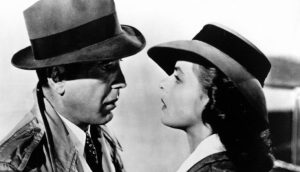Message of Casablanca resonates down the decades
Eighty years ago this month the Hollywood classic Casablanca was released to universal acclaim.
Set in Rick’s Cafe, a nightclub in the Vichy-controlled Moroccan city during World War II, the story centres ostensibly around a love triangle.
Humphrey Bogart stars as Rick, a cynical American bar owner who repeatedly claims to be neutral in the war. Ingrid Bergman plays his old flame Ilsa Lund, who is now married to Victor Laszlo, a dashing resistance leader played by Paul Henreid.
But more than just a love story, Casablanca is a film about refugees fleeing repression and worse in Nazi-occupied Europe – a theme that resonates today with millions of Ukrainians displaced because of the Russian invasion of their country, and also with more than 100 million people forcibly displaced across the globe.
The film cast itself is also stacked with refugees; many of the actors who play refugees in flight were actually refugees themselves.
 Helmut Dantine plays Jan Brandel in the movie. Brandel is a young refugee who has fled Europe with his wife. In one scene, Jan is playing roulette, hoping to win enough money to buy their exit visas.
Helmut Dantine plays Jan Brandel in the movie. Brandel is a young refugee who has fled Europe with his wife. In one scene, Jan is playing roulette, hoping to win enough money to buy their exit visas.
When Rick (Bogart) sees he is losing, he rigs the game to help Jan win, ensuring he has enough cash to secure he and his wife’s passage to America.
Dantine was born in Austria and, as a teenager, became the leader of the anti-Nazi youth movement in Vienna. When the Nazis annexed Austria in March of 1938, they immediately arrested the 19-year-old.
His family used their political connections to negotiate his release, and immediately sent him to the United States. He landed in Los Angeles, enrolled at UCLA, and began his acting career.
Dantine went on to be cast as villains in other war-time films, playing Nazi officers opposite Errol Flynn in Northern Pursuit (1943) and Escape in the Desert (1945).
“It must have been incredibly hard for him emotionally. Having been the leader of the anti-Nazi youth movement, to then be playing Nazis in film,” his widow Niki Dantine later said in a radio interview.
There were several other European-born actors in Casablanca who had made it to Hollywood after fleeing the Nazis.
Paul Henreid, who plays Victor Laszlo in Casablanca, was an Austrian actor and an anti-Nazi.
In 1937 he was in the UK playing Prince Albert on the stage. Later, when the war broke out in 1939 he risked being interned or deported as an enemy alien.
After colleagues spoke up for him, he was allowed to stay and to continue his work in British films. In 1939 he had a notable supporting role as Staefel in Goodbye Mr Chips and the next year third billing as a German espionage agent in the thriller Night Train to Munich.
Conrad Veidt plays Nazi officer Major Strasser. Veidt was a German actor whose wife was Jewish. Like Dantine, he escaped the Nazis only to find success portraying them on screen.
Peter Lorre plays Ugarte, a customer at Rick’s Cafe who steals from German couriers at the start of the film. Lorre began his career as a stage actor in Vienna and Berlin, and became internationally known with his performance in Fritz Lang’s M (1931) and in America for his role in The Maltese Falcon (1941).
SZ Sakall plays Carl the waiter. Before the war, Sakall was a Hungarian cabaret actor. Members of his family died in the death camps and he escaped to Hollywood, where he was known as “cuddles” and often cast in comedic roles.
Marcel Dalio plays Emil, the croupier. In France, Dalio was a star, known for his roles in Jean Renoir’s La Grande Illusion (1937) and The Rules of the Game (1939). Dalio was Jewish and he fled Paris in 1940 with his wife Madeleine Lebeau — who plays Yvonne in Casablanca.
As well as a love story, Casablanca is also a political propaganda film because at the time the American public were not fully convinced of the need to oppose Nazi Germany.
The character of Rick is a metaphor for the US’ isolationist policy.
He begins the film telling Ilsa: “I’m not fighting for anything anymore, except myself. I’m the only cause I’m interested in”.
But as the story unfolds Rick is drawn more and more into supporting the cause of freedom.
During World War II, Hollywood often provided a refuge and a job for European emigres.
But after the war things changed. For many, the work dried up as Hollywood turned its focus back to life in America.
Some would be targeted by Senator Joe McCarthy’s House Committee on Un-American Activities. Others returned to post-war Europe.
But Niki Dantine said Casablanca left an indelible mark on Americans.
“I think the film gave Americans an opportunity to see what it was like to survive and how your life hangs in the balance during wartime,” she said.












